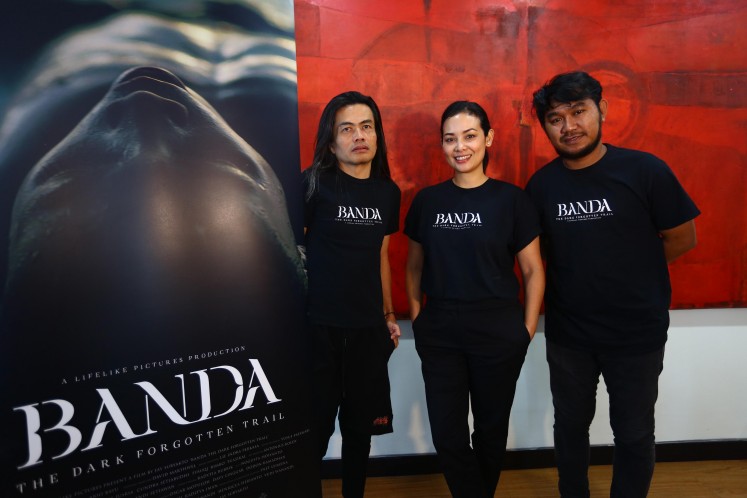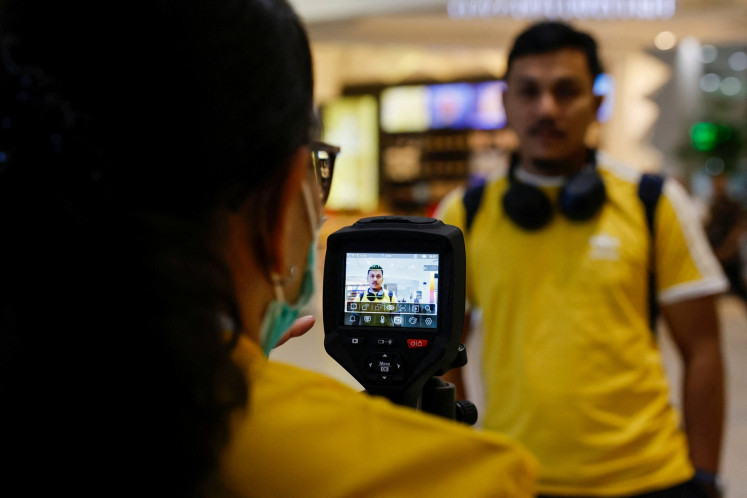Popular Reads
Top Results
Can't find what you're looking for?
View all search resultsPopular Reads
Top Results
Can't find what you're looking for?
View all search results‘Banda’ wants to break documentary stereotype
Change text size
Gift Premium Articles
to Anyone
S
ince 2008, film company Lifelike Pictures has produced feature films, such as Modus Anomali, Pintu Terlarang (The Forbidden Door) and Tabula Rasa. However, this year, it decide to make a feature documentary, Banda: The Dark Forgotten Trail, which will premiere on Aug. 3.
Set in the Banda Islands, Maluku, the documentary narrates the history of the islands from its days on the spice trail with nutmeg. Banda: The Dark Forgotten Trail also reveals how obsessed Europeans were with spices in 15th and 16th centuries, Dutch colonization and genocide in Banda that has affected the islands’ social structure and nutmeg until today. The documentary also touches on the issue of religious conflict in 1999 and tells the story of Indonesia’s founding fathers who were exiled to the islands prior to independence.
The documentary’s producer, Sheila "Lala" Timothy told The Jakarta Post that the idea came to her when she attended an exhibition about the Spice Trail in 2015, where heard the claim that the Spice Trail had helped form the Silk Road.
“Those words triggered something in me,” she said, adding that she went there with her husband, Luki Wanandi. “Honestly, my husband and I didn’t know much about the Spice Trail, Indonesian spices or Banda. We thought it was very interesting, but unfortunately, many Indonesians didn’t know about this. […] So we thought that this was one fragment that should be told [to the public].”
Lala said she did not want to make a fiction film from the idea. “It’s because we thought that there were so many facts, a history that must be shared and the most suitable form to do this was through a documentary,” she explained.
Read also: ‘Banda: The Dark Forgotten Trail’ highlights the nearly forgotten Spice Islands
Banda was selected because the islands were perceived to be representative of the long Spice Trail. “When we talk about Banda, we talk about the history of an area and also the Spice Trail,” said scriptwriter Irfan Ramli who acknowledged that Banda: The Dark Forgotten Trail was his first documentary. “And spice isn’t the only thing that is interesting in Banda because there were so many things that happened later, such as colonialism, slavery and the birth of nationalism.”
Lala’s choice for director was Jay Subyakto, who had never directed a documentary before. However, Jay gave 100 percent in doing it as he used six cameras to immortalize the beauty of Banda, and asked renowned names within the film industry to join the bandwagon, among them Davy Linggar, Oscar Motuloh, Ipung Rachmat Syaiful and Aline Jusria.
Jay also paid attention to sound quality of the documentary. “I wanted the sound to be surrounding […] so there is intensity when people watch it,” he said, adding that he wanted to proved wrong the stereotyping that documentaries are boring.
There is a belief that all of the natives of Banda had been annihilated, but Lala clarified, “No, actually we also don’t say that in the documentary. When Jan Pieterszoon Coen (former governor-general of the Dutch East Indies Company, VOC) committed genocide in 1621, around 14,000 people were killed, while around 400 people escaped from Banda,” she explained.
“Because we talk about Banda, we narrate about people after the genocide, which involved various tribes that were brought by the Dutch to the islands as slaves to work on nutmeg plantations,” she continued.
“We’re not the experts in documentaries [...] and history, but what we’re trying to present is [that] we want this documentary to be a topic, meaning that people will be interested in learning about history and want to find out more about that,” Lala added. “Hopefully people can watch and see the situation in Banda, so they can do something for the islands.” (asw)












